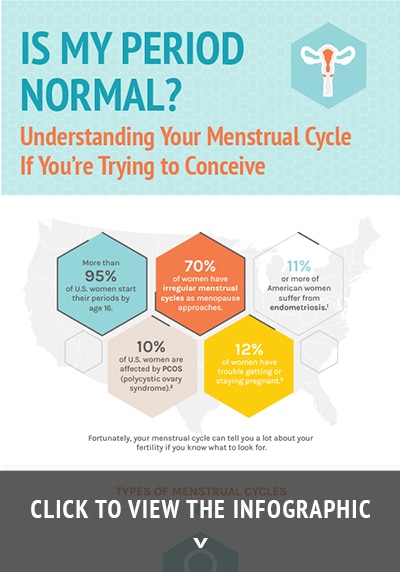When to seek help
Traditionally, a fertility specialist will assume infertility is present based on the following definition. When a woman is:
- Under 35 with regular cycles, unprotected intercourse and no pregnancy after 1 year
- 35 to 39 with regular cycles, unprotected intercourse and no pregnancy after 6 months
- 40 or over with regular cycles, unprotected intercourse, more immediate evaluation and treatment are warranted
The traditional definition assumes a heterosexual partnership as well as regular menstrual cycles. If any of the following apply, you may want to speak with a fertility specialist sooner:
- Irregular or absent periods
- Prior diagnosis of endometriosis or PCOS
- Two or more miscarriages
- Unable to ejaculate
- Prior surgery or medical conditions that may complicate conception or pregnancy, including pelvic inflammatory disease (PID) or other sexually transmitted infections
- Known structural abnormalities of reproductive organs
- Endocrine (hormonal) disorders such as thyroid disease
- Pituitary tumors or hyperprolactinemia
- Family history of genetic disorders
- Single women
- Gay or lesbian couples
- Transgender individuals
Find a Doctor Near You
Discover how we can partner with you to help overcome infertility.
How do I know if I have infertility?
Do men have infertility?
Yes, in fact, nearly 40% of semen analyses demonstrate abnormal sperm, which many contribute to infertility. Which is why we must test both the male and female for infertility when a couple is having difficulty conceiving.
Infertility is often thought of as a female problem. This is a myth.
Are there any early warning signs that infertility may be a problem for a woman at any age?
Regardless of age, women with any of the following should proactively talk with a physician about how these conditions could affect their ability to get pregnant:
- Irregular menstrual cycles (a sign of polycystic ovary syndrome, or PCOS), severely painful periods, or no period on a regular basis (monthly)
- A history of pelvic surgery (such as the removal of an ovarian cyst, ablation of endometriosis, ectopic pregnancy, tubal surgery, or ruptured appendix)
- Diagnosis of endometriosis
For women with any of these conditions, if you’re having difficulty conceiving, we recommend seeking an evaluation even sooner than what we typically recommend.
Are there any early warning signs to look out for that may indicate I will have trouble getting pregnant?
Yes, the more proactive you can be and seek intervention early, the better your chances are for success. Early warning signs may include:
- The absence of a menstrual period on a regular basis is typically the number one indicator that a problem may be present.
- Women 35 years and older are more likely to experience infertility and should speak with a physician sooner.
- If the male has trouble achieving or maintaining an erection, or is unable to ejaculate in the vagina, this may signal a problem.
- If a complex medical condition exists, we recommend counseling about the risks of pregnancy prior to conceiving. While the condition may not preclude pregnancy, it’s best to discuss.
- If either partner has a family history of a genetic disorder, it may affect the couple’s ability to conceive.
- Two or more miscarriages increase the likelihood of an underlying fertility problem.
While individuals in a same-sex relationship may not necessarily be infertile, the couple should still have an evaluation and will often need assistance building their families.
When and where should I seek help if I don’t get pregnant?
Often times, your obstetrician/gynecologist (OB/GYN) and urologist can conduct basic female and male diagnostic testing, as can a reproductive endocrinologist or reproductive urologist. The choice of where to begin is often dictated by insurance. Success with any intervention is highly dependent on the quality of the egg so the main thing is to get tested and begin treatment with increasing urgency if the female is older than 35.
A fertility specialist, or reproductive endocrinologist (RE), is a physician who not only completed the rigorous educational requirements to become an obstetrician/gynecologist (OB/GYN) but also advanced training and a fellowship specifically in reproductive endocrinology and infertility (REI), often completing up to 10 years of postgraduate training.
When should I/we consult a fertility specialist?
- When people meet the definition of infertility (see above)
- When basic treatment, often clomiphene citrate (Clomid, Serophene), has not resulted in pregnancy after 6 months
- When severe male factor exists

